The CoLeague Experience - Explore, learn, Share
’The CoLeague Experience’ offers concise 10–15 minute episodes packed with experimentation, inspiration, and fresh insights into modern management and workplace culture. Each episode challenges conventional thinking and delivers actionable strategies to redefine leadership in today’s fast-paced world. Tailored for busy executives, every installment distills complex ideas into clear, impactful takeaways. Tune in to gain innovative perspectives that empower you to drive transformative change within your organization. #CoLeagueLeadershipLab #LeadershipInsights #ModernManagement #WorkplaceCulture #ExecutiveLeadership #LeadershipStrategies #InnovativeLeadership #TransformativeChange #ManagementTrends #LeadershipDevelopment #BusinessSuccess #ExecutiveGrowth #WorkplaceInnovation #LeadershipMindset #ActionableLeadership
Episodes
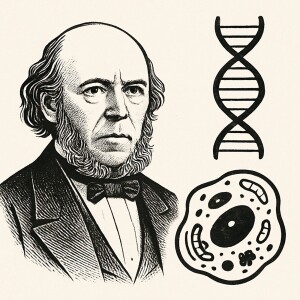
Monday May 12, 2025
Monday May 12, 2025
Karl Marx and Herbert Spencer, buried near each other in Highgate Cemetery, had opposing ideologies. Spencer believed in individualism and social Darwinism, viewing society as an evolving organism. This text draws parallels between biological and organizational dynamics, highlighting how organizations, like living creatures, have DNA, require energy, and maintain boundaries. Organizational behavior, including inherited patterns and resistance to change, mirrors biological processes like evolution and immunity. The discussion delves into how these dynamics affect growth, innovation, and adaptation, emphasizing the importance of viewing organizational development through a biological lens to understand challenges and opportunities.#OrganizationalBiology, #KarlMarx, #HerbertSpencer, #SocialDarwinism, #OrganizationalBehavior, #Innovation, #Adaptation

Thursday May 08, 2025
Thursday May 08, 2025
William Paley argued that complex natural systems required a designer, but Charles Darwin later demonstrated that natural selection could create design without a designer. Stuart Kauffman introduced "self-organization," suggesting nature tends towards order without external direction. This concept applies to social systems, enabling innovation through self-organized networks, like hackathons, that foster creativity and collaboration beyond traditional hierarchical structures. Organizations can harness these principles to balance structure and freedom, avoiding stagnation and encouraging dynamic problem-solving approaches. Recognizing order within freedom, as Kauffman suggests, can transform organizational dynamics and unleash potential.#complexsystems, #naturalselection, #selforganization, #innovation, #collaboration, #organizationaldynamics, #creativity

Monday May 05, 2025
Monday May 05, 2025
CoLeague highlights a common misconception in organizations where executive teams are assumed to function cohesively, whereas they're often just individuals reporting to the CEO. The key to a true management team lies in a distinct, collective mission requiring interdependence. Without this, cohesion efforts fail. Effective teams focus on structuring processes, not just achieving goals.#management, #teamwork, #leadership, #executiveteams, #organizationalculture, #cohesion, #processimprovement
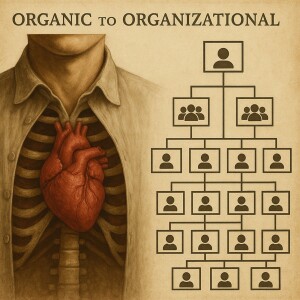
Thursday May 01, 2025
Thursday May 01, 2025
We explore the evolution of the term "organization" from "organ" and highlights the reversal in understanding from human body functions to structured social systems. Despite advancements in understanding social systems, organizations still adhere to traditional order. Real-world examples show that embracing "bounded freedom" enhances adaptability and innovation, challenging the illusion of control and predictability. The text argues for leadership to navigate complexity by balancing order and freedom, encouraging organizations to relinquish rigid control for more dynamic, organic development. This perspective emphasizes that freedom doesn't equate to chaos, advocating for a flexible approach to organizational growth.#organization, #leadership, #innovation, #adaptability, #socialsystems, #complexity, #flexibility

Monday Apr 28, 2025
Monday Apr 28, 2025
Émile Durkheim's sociological insights on social solidarity parallel organizational dynamics. As organizations grow, differing norms and values can lead to anomie, creating internal conflict and pathologies. Successful transitions require redefining "organizational glue" beyond regulations to maintain cohesion. Understanding these dynamics is crucial for managing change and ensuring long-term organizational health and performance.#organizationaldynamics, #socialsolidarity, #EmileDurkheim, #anomie, #changeManagement, #organizationalhealth, #cohesion
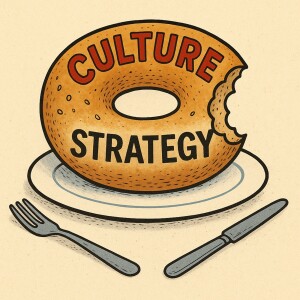
Thursday Apr 24, 2025
Thursday Apr 24, 2025
The central role of leaders is to create organizations that fit human nature, emphasizing the significance of organizational culture. Noel Tichy's model categorizes organizational components as solid (operations), liquid (relationships), and gas (culture). Real-world examples highlight culture's impact on collaboration and innovation. Culture, often seen as immutable, deeply influences organizational success, challenging leaders to influence rather than change it.#leadership, #organizationalculture, #innovation, #collaboration, #NoelTichy, #businessstrategy, #organizationaldevelopment
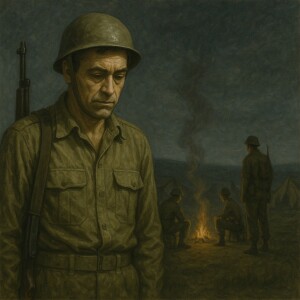
Monday Apr 21, 2025
Monday Apr 21, 2025
Alterman's "Night Encampment" contrasts elevated language with the harsh realities of military life, reflecting the tension between idealism and the brutality of war. This dynamic mirrors high-pressure organizational environments where stress leads to conflict rather than collaboration. By recognizing mutual vulnerability and applying compassion, individuals can transform adversarial interactions, fostering human connection amidst challenges.#podcast, #militarylife, #compassion, #war, #conflictresolution, #organizationalculture, #humanconnection
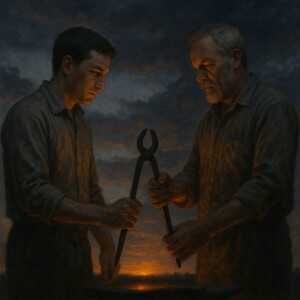
Thursday Apr 17, 2025
Thursday Apr 17, 2025
The Sages' paradox of crafting tongs needing pre-existing tongs highlights twilight as a metaphor for transitions and identity shifts. This murky time symbolizes the potential for new possibilities from uncertain situations. Organizations, like a software company and a biotech start-up, face similar challenges, requiring boundaries to navigate change and redefine identities successfully.#transformation, #change, #identity, #metaphor, #transition, #innovation, #organization
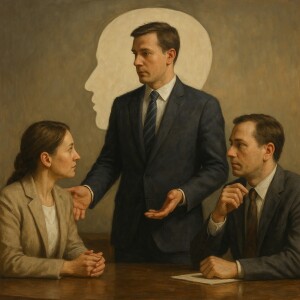
Monday Apr 14, 2025
Monday Apr 14, 2025
Hans Blumenberg, affected by his wartime experiences, explored the philosophical significance of metaphors, arguing they reveal deeper insights into human perception than explicit concepts. This approach is applied in executive coaching, where metaphors like "head and body" illuminate complex management-organization dynamics. Metaphorical analysis uncovers unconscious concerns, revealing hidden insights into decision-making processes and leadership challenges.#metaphors, #executivecoaching, #leadership, #management, #philosophy, #decisionmaking, #HansBlumenberg
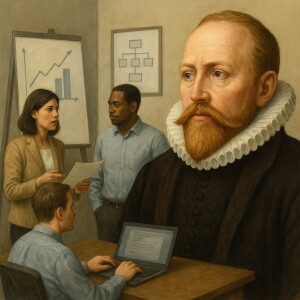
Thursday Apr 10, 2025
Thursday Apr 10, 2025
Tycho Brahe, a notable historical figure, revolutionized scientific collaboration by building an observatory employing around 100 specialists, a concept groundbreaking for his time. This approach laid the foundation for modern organizational structures, where specialization and departmental divisions are common. However, these divisions can hinder communication, leading to power struggles and inefficiencies. Effective organizations must balance specialization with cross-departmental collaboration to achieve shared goals. Examples illustrate the challenges and benefits of fostering interdepartmental communication, emphasizing the importance of recognizing when organizational structures either support or hinder progress.#TychoBrahe, #ModernWorkplace, #ScientificCollaboration, #OrganizationalStructures, #InterdepartmentalCommunication, #Specialization, #WorkplaceEfficiency








